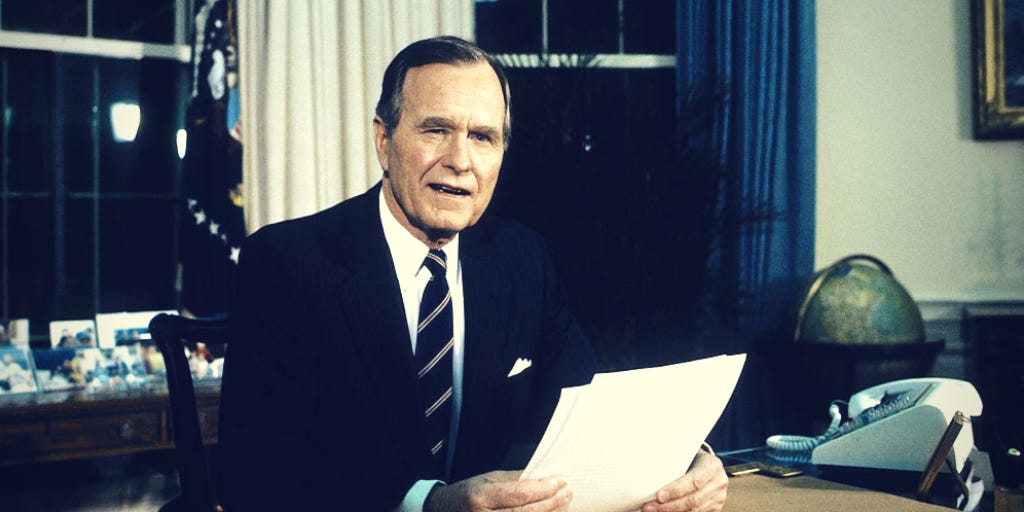
Discover more from Bernard Goldberg's Commentary
As the nation says goodbye to a true patriot in George H.W. Bush, political figures and media commentators from both sides of the aisle have been championing the stories and qualities that made the former president such an honorable man and admired public servant. Words like grace, integrity, decency, and humbleness have been used in abundance this week, and it has been heartening to hear so many people speak glowingly of the man who worked hard to inspire those qualities in others.
We heard similar sentiments expressed earlier this year after the passing of other iconic figures from the political right, including Barbara Bush, John McCain, and Charles Krauthammer. It's a reminder of how tough of a year it has been for the old Republican guard.
What makes the losses even harder, at least for me, is when you take into account how many of the same observers, who've been publicly praising Bush and the others in death, have been insisting over the past few years that the traits that made those individuals special are emblematic of weakness and defeatism in today's political culture.
It's no secret that the era of Trump has altered the mindsets of a lot of people — especially those on the right. Many righties now argue that the political culture has so significantly eroded since the days of George H.W. Bush's tenure in the White House, that to compete within today's uglier framework, the Right must embrace the worst inclinations of the Left.
Instead of calling for a "kinder, gentler nation," and trying to build good-faith relationships, the key to success is to demagogue endlessly, play fast and loose with the truth, attach the worst possible motivations to your opponents, and fight, fight, fight!
And there's certainly evidence to suggest that it's the correct strategy. After all, Donald J. Trump was elected president, after the "Mr. Nice Guy" candidacies of John McCain and Mitt Romney were failures.
Author, filmmaker, and noted Trump enthusiast Dinesh D'Souza weighed in on this theme the other day on Twitter:

While it's a bit hard to take seriously a metaphor in which a guy who enlisted in the military at age 18 to become a combat pilot is Mother Teresa, and a guy who sought five war deferments (include one for bone spurs) is Dirty Harry, D'Souza's point isn't hard to follow.
Of course, one can also challenge the notion that bare-knuckled scorched-earth politics are now the necessary means by which the Republican party and the presidency can survive, legislate, and govern. I've been issuing that challenge in my commentary for quite some time, because I think a lot of the lessons Republican voters learned from 2016 were bad ones, and built upon flawed premises.
I think, despite his unexpected appeal to certain sectors of the electorate, Trump won primarily because of how absolutely terrible of a candidate Hillary Clinton was. I suspect about half of the bloated field of Republican primary candidates would have also defeated Clinton in the general election. And since taking office, I don't believe President Trump's combative nature has helped him govern one bit. In fact, I think it's been nothing but a liability. What Republicans and conservatives recognize as Trump's defining achievements would have come just as easily (probably more so) if he espoused the same traits as George H.W. Bush. He'd also likely have more wins under his belt.
Additionally, if Trump were more like Bush, I don't believe the Republicans would have lost nearly as many House seats, governorships, and local offices as they did in the midterms, regardless of how hard the media was pummeling him. People weren't voting against Trump's policies. They were voting against Trump.
Many Trump supporters have been quick to point out that it is historically quite normal for the party in charge to lose seats in the midterms. That's absolutely true. It's also historically normal for the opposition party to take back control of the White House after a two-term presidency (as we saw in 2008), and then hold the presidency for a second term (as we saw in 2012). Yet, the Republican base largely attributed those losses to the GOP nominees being too nice.
What's not historically normal is the sheer number of seats that were lost by the Republicans last month, and the rapid pace at which voters are abandoning the party (most notably in the suburbs). It's also not normal how willing people have been to turn their backs on principles and common decencies they had long ascribed to, for the sake of partisan loyalty to a politician.
Over the past few years, we on the right have been conditioned to believe (at the insistence of many on cable news and talk radio), that in this day and age, Trump's way is the only way forward for Republicans and the nation. I think that's exactly wrong.
What the party and country so desperately need right now is some of that compassion, humility, and lightheartedness that George H.W. Bush (and others from that era) so famously exhibited. I'm under no illusion that we'll actually see it from today's political leaders, but we can hopefully channel it from some past ones, and lead by example in our own lives.
If it's true — as the saying goes — that culture is upstream from politics, we are in a better position to change the political culture than we think. As a political outsider, Trump was undeniably elevated by the ugliness and divisiveness that had marred our culture (including our politics) for quite some time. We can't hope for that culture to suddenly get any better without taking the reins and changing the direction ourselves.
Subscribe to Bernard Goldberg's Commentary
Media and political analysis













